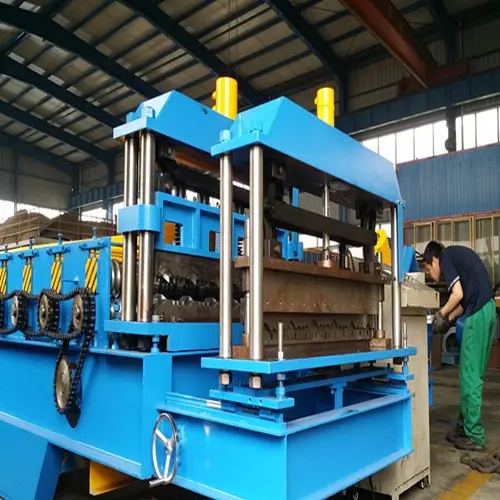
Fully Automatic Cable Tray Cold Roll Forming Revolutionizing Electrical Infrastructure
In the ever-evolving landscape of electrical installation and management, the demand for efficient and reliable infrastructure is paramount. One of the key components that support this infrastructure is the cable tray—a vital structure that provides a pathway for electrical wiring. With advancements in manufacturing, the fully automatic cable tray cold roll forming machine has emerged as a cutting-edge solution, revolutionizing how cable trays are produced and minimizing labor costs while maximizing efficiency.
Understanding Cold Roll Forming
Cold roll forming is a continuous bending process where metal sheets are shaped into desired profiles at room temperature. This method is highly efficient in producing various forms such as bends, curves, and angles. The cold roll forming process is characterized by its ability to produce intricate designs with high precision, making it ideal for manufacturing cable trays that meet the specific requirements of different projects.
The Advantages of Fully Automatic Systems
The introduction of fully automatic cable tray cold roll forming machines has significantly transformed the manufacturing landscape. Here are several advantages of utilizing fully automatic systems
1. Increased Efficiency Fully automatic machines are designed to operate continuously with minimal human intervention. This lead to significantly increased production rates, allowing manufacturers to meet high demands without the need for extensive labor.
2. Consistency and Quality Automated systems ensure that each produced cable tray adheres to strict quality standards. Precision in the forming process reduces defects and variations that are commonly associated with manual operations. The result is a more reliable product that meets industry specifications.
3. Versatility Modern machines possess the capability to produce different types of cable trays, including ladder trays, solid-bottom trays, and perforated trays, with just a few adjustments. This flexibility allows manufacturers to diversify their product offerings and cater to various market requirements.
4. Reduced Labor Costs The automation of the roll forming process significantly reduces the workforce needed for manufacturing operations. This not only lowers labor costs but also decreases the risk of workplace injuries associated with manual handling of heavy steel sheets and complex machinery.

5. Rapid Setup and Changeovers Fully automatic systems often come equipped with advanced software that enables quick setup and changeover between different production runs. This feature is particularly beneficial for manufacturers looking to produce custom solutions or handle varying project specifications.
Applications of Cable Trays in Electrical Systems
Cable trays are essential components in a variety of settings, including industrial plants, commercial buildings, and infrastructure projects. They serve several important functions
- Organizing Electrical Wiring Cable trays effectively organize and support electrical wiring, making installations cleaner and more manageable. This organization simplifies maintenance and upgrades in the future.
- Promoting Safety By providing a structured pathway for cables, trays help prevent overheating and reduce the risk of electrical fires associated with mismanaged wiring.
- Facilitating Air Circulation Many designs of cable trays allow for sufficient air circulation around cables, which is critical for heat dissipation. This helps maintain optimal operating temperatures and prolongs the lifespan of electrical components.
The Future of Cable Tray Manufacturing
As the electrical industry continues to expand and innovate, fully automatic cable tray cold roll forming technology will play a crucial role in meeting future demands. Emerging trends such as the Internet of Things (IoT), smart buildings, and renewable energy sources are driving the need for more sophisticated electrical infrastructure. The adaptability and efficiency of automatic cold roll forming systems position them as the backbone of future cable tray production.
In conclusion, the advent of fully automatic cable tray cold roll forming machines has significantly improved the efficiency, quality, and flexibility of cable tray manufacturing. As the industry progresses, this technology will be essential in supporting the growing complexities of modern electrical installations, ensuring that infrastructure is not only robust but also capable of meeting the evolving needs of society. Embracing automation in cable tray production is not merely an option; it is a necessity for manufacturers looking to thrive in a competitive marketplace.